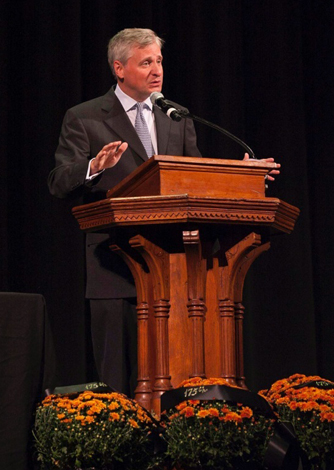
Jon Meacham. Photo by Lizz Cardwell.
Thomas Jefferson holds an important place in the lore of the University of Missouri.
His granite tombstone resides on the east side of Francis Quadrangle, and its marble epitaph, recently restored, is being displayed at various sites; both were gifts from Jefferson’s family. At his inauguration last month, Chancellor R. Bowen Loftin was presented with the Jefferson medallion, to be worn at ceremonies and formal occasions. MU’s Corps of Discovery Lecture series is named after Lewis and Clark’s expedition, championed by Jefferson in his first term as president. And MU’s core values of discovery, excellence, responsibility and respect align with the Virginian’s ideals.
During his Sept. 15 lecture at the Missouri Theatre, Jefferson biographer Jon Meacham spoke about Jefferson’s reverence for higher education and his belief that an educated citizenry is the engine of a democratic government. He connected Jefferson’s values to those of MU.
“Jefferson balanced the inspirational and the pragmatic,” said Meacham, whose lecture kicked off a week of events celebrating MU’s 175th anniversary. “He believed in the possibilities of humanity.”
The American republic, with its embrace of freedom of speech and democratic elections, was founded as a rebuke to the top-down governing style of the British monarchy. “Universities were important in this shift to the horizontal,” said Meacham, explaining Jefferson’s view. “Universities offer us a way of knowing and thinking.
“If you don’t have an educated citizenry, your republic won’t work,” he said.
Meacham is an American historian with a solid background in journalism. He was editor-in-chief of Newsweek from 2006 to 2010. Among his books is American Lion: Andrew Jackson in the White House, for which he won a Pulitzer Prize. In 2012 he published Thomas Jefferson: The Art of Power.
The book was popular in part because it portrayed Jefferson as reaching across the aisle to overcome political gridlock, which resonated with an audience yearning for bipartisan decision-making in Washington, D.C. “Jefferson understood a timeless truth,” Meacham wrote, “that politics is kaleidoscopic, constantly shifting, and the morning’s foe may well be the afternoon’s friend.”
Meacham is not blind to Jefferson’s foibles. The founding father was an awkward public speaker and a slave owner who fathered children from at least one slave. Unlike Abraham Lincoln, who grew up poor with no ladder in sight for upward mobility, Jefferson was born into a well-heeled aristocratic lifestyle he thoroughly embraced.
But historians also consider the Virginian the father of American democracy, penning at age 33 most of the Declaration of Independence. He upheld education at every turn, even founding the University of Virginia, and wrote of the importance of individual rights.
His Louisiana Purchase in 1803 generated the momentum for an America that stretches, as the song says, “from sea to shining sea.” Jefferson’s family gifted MU the tombstone and plaque in part because MU was the first public land-grant university founded within the Louisiana Territory.
“Jefferson created the most precious of things,” Meacham said. “Possibilities.”